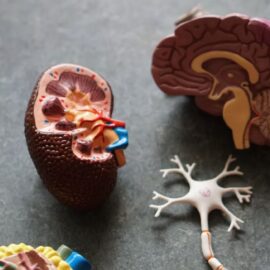

This article is an excerpt from the Shortform book guide to "Why Zebras Don't Get Ulcers" by Robert Sapolsky. Shortform has the world's best summaries and analyses of books you should be reading.
Like this article? Sign up for a free trial here.
How does stress affect mental and emotional health? Can stress cause depression or anxiety?
In Why Zebras Don’t Get Ulcers, neuroscientist Robert Sapolsky explains how our bodies haven’t evolved to deal with the never-ending mental stressors of modern life. He further describes how chronic stress affects mental and emotional health when you’re unable to effectively cope with stress.
Keep reading to learn how stress affects mental and emotional health, according to Sapolsky.
How Stress Affects Mental Health
In his book Why Zebras Don’t Get Ulcers, biologist and neuroscientist Robert Sapolsky argues that the chronic stress humans regularly feel can be extremely damaging to their bodies. Because dealing with a stressful event can be so intense, and potentially important to one’s survival, the stress response affects virtually every system of the body. So, how does stress affect mental and emotional health?
Chronic stress doesn’t just impact your physical health: It also impacts your mental health. Sapolsky argues that there’s a significant link between stress and mental disorders such as depression and anxiety, which both involve a person inadequately dealing with stress.
In this article, we’ll explain Sapolsky’s findings about how chronic stress affects mental and emotional health by explaining its close relationship to depression and anxiety.
Depression
Sapolsky states that stress affects your mental and emotional health because chronic stress is often a precursor to a depressive episode. Depression has long been linked to an imbalance or deficiency of neurotransmitters such as norepinephrine, which, as we’ve discussed, makes your body immediately react to a stressor. Furthermore, people suffering from major depression usually have elevated levels of glucocorticoids, a sign of an overactive stress response. Taking all of this into account, here’s a simplified version of how someone falls into a depression:
- First, a significant stressor or series of stressors occurs, causing neurochemical changes that lead to a depressive episode. The more stress you’ve had in the past, especially if at a young age, the more likely these neurochemical changes are to occur.
- Then, glucocorticoids are released that alter the neurochemical processes, helping you recover. Unfortunately, for some people, these recovery processes don’t work as well due to their genetic makeup, making it more likely they’ll fall into a long-term, severe depression.
Sapolsky states that the defining feature of depression is the inability to feel pleasure, also known as anhedonia. People suffering from depression can struggle with feelings of grief or guilt, slow movement or speech, weakened immune systems, lack of libido, and trouble maintaining healthy sleeping and eating habits. These symptoms prevent the sufferer from coping with the stress that caused the depression in the first place.
(Shortform note: The idea that anhedonia is the main symptom of depression is a feature of Western medicine. In the US especially, medical practitioners mainly look for the emotional and cognitive symptoms of depression. In China, the focus is more on physiological symptoms like the inability to concentrate or sleep.)
| How Depression Worsens Your Stress Response Research shows there are specific ways depression can prevent you from effectively handling day-to-day problems. For instance, people with a history of depression are more likely to have a greater decline in their mood when dealing with chronic pain, and pain is more likely to compromise their daily emotional well-being and capacity to cope. There are two competing hypotheses on why depression affects people’s ability to cope with stress. The first, known as the “scar hypothesis”, posits that a depressive episode leaves emotional “scars” that leave them more vulnerable to future mood alterations. The second, known as the “trait marker” hypothesis, posits that people who have suffered from depression have pre-existing traits that make them more vulnerable to stress, and these traits persist even after a depressive episode occurs. |
Anxiety
Like people with depression, the mental and emotional health of people with anxiety disorders is also affected by stress because they usually have an overactive stress responses. The main difference, according to Sapolsky, is that while depressed people have more or less given up on trying to cope with stress, people with anxiety are still able to use coping mechanisms. The problem is that people with anxiety disorders constantly mobilize their stress responses, even when they don’t need to. They’re hypervigilant, overestimating dangers and letting their imaginations lead to a constant state of dread or foreboding. Unsurprisingly, aside from their mental and emotional health, people with anxiety disorders are much more likely to suffer from many other diseases exacerbated by chronic stress.
(Shortform note: Experts note that around 30-40% of people in Western societies will develop an anxiety disorder at some point in their lives. It’s believed that anxious feelings do have a purpose, such as protecting us from dangers and helping us deal with challenges, and it’s improbable that anxiety would be so common if it didn’t help us in some way. However, anxiety becomes a disorder when the sufferer holds inaccurate beliefs that don’t serve them and aren’t based on any objective reality. Furthermore, a major hurdle in tackling anxiety issues is that they cause avoidance behaviors that make it difficult for an anxious person to engage in the activities that would contradict their inaccurate beliefs.)
Though the mental and emotional health of those suffering from anxiety and depression are both affected by stress due to the overactive stress response, the biological responses differ. With depression, you often see a higher level of glucocorticoids, as the brain tries to recover from a stressor and prepare for the next one. Anxiety, on the other hand, is more often associated with a hyperactive sympathetic stress response (excess epinephrine and norepinephrine), as the brain is constantly on edge and trying to deal with a current stressor.
Through these hormonal and neurochemical responses, we can see how anxiety sometimes leads to depression: Someone constantly tries to cope with a multitude of stressors, showing high sympathetic activation (anxiety). Eventually, if the stress becomes too much to handle, they may give up trying to cope and show high levels of glucocorticoids (depression).
(Shortform note: Another way to frame the difference between anxiety and depression is that depression is associated with a focus on the past while anxiety is focused on the future. This framing is based on the assumption that these negative mental states provide some form of adaptive value to the sufferer: Depression is usually caused by the loss of a goal. So people dwell on the past as a way to come up with a new goal or strategy. Anxiety, on the other hand, is more about dealing with a potential threat to one’s self-preservation. So anxiety entails an obsessive focus on potential future dangers.)

———End of Preview———
Like what you just read? Read the rest of the world's best book summary and analysis of Robert Sapolsky's "Why Zebras Don't Get Ulcers" at Shortform.
Here's what you'll find in our full Why Zebras Don't Get Ulcers summary:
- The physical and mental harm chronic stress does to your body
- The steps you can take to reduce stress in your life
- Why you should make your life more predictable






